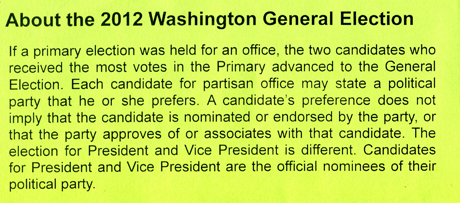
Where I live, the Democratic Party rules the roost. A solid plurality of the population — a voting majority — is Democratic, and the party machinery piles on with a tradition of insidery corruption. An old Democrat hand in the legislature wins his umpteenth re-election bid, serves a few months, and then resigns. Appointed in his place is a young Democratic Turk, ready and rarin’ to serve a lifetime in office. He then wins re-election, and the process repeats. At least one of “my” two state reps got in like this, and I believe “my” state senator got in by such a move.
My friend Tim Sutinen is running, again, against longtime incumbent Brian E. Blake. He’s listed on the ballot as “prefers Independent Party,” even though I’m not sure if such a party actually exists in the state.
But in Washington State, that doesn’t matter. Here, where the state motto is “by and by,” we have a happy-go-lucky system known as a “Top Two Primary.” The political parties may grind the gears of their machines all they want behind the scenes, but any contestant for office can ally himself with any entity, fictional or factual or metaphysical. My neighbor to the north of me (if I were to trek over a hill or two) ran as “prefers Grange Party,” a few years ago, even though there is no Grange Party, and the Grange is prohibited from running candidates. By law.
Weird system. Yes. My neighbor ran because he wanted to show that the system abridged freedom of association, in essence hi-jacking private parties. It was a protest run. He made his point, and because he was famous a few people actually noticed.
My preference would be to outlaw all mention of parties on ballots, use an ordered, preference ballot, and count votes by the Condorcet method.
But that won’t happen anytime soon. Not long ago the Supreme Court refused to rule on the state’s goofy system. So it stands.
Sutinen, in any case, is independent. He hates the Republican Party he once was a part of. He believes the people involved in it have no principles. He thought they stood for freedom, but once he got involved in high-level state party politics, he became quickly disillusioned.
Sutinen wants less government. He thinks less is better, far better. He wants fewer taxes, and less of a tax burden. And he wants less government in return. He’s one of those few “limited government” politicians to dare actually specify what he’d cut.
Of course, he hasn’t won, yet. He’s tried twice before, I believe. This time, he entered as a write-in candidate in the primary, and got enough votes as a write-in to earn a slot on the general election ticket. I wish him the best of luck. I just voted for him. We’ll see if he can beat the Democratic juggernaut, though. Even if he doesn’t, his approach to running is something of a novelty, an interesting by-product of the weird Top Two Ballot.
Not a justification for it, but still: Good for him.

[…] Wirkman Netizen Insert Ideas Into Head; Observe at Safe Distance « Top Two Primary […]